The electric guitar has existed for over a hundred years at this point, and its popularity has stayed fairly consistent during that time. It’s not hard to imagine then that people have come up with all kinds of myths, old wives tails, and other tricks that are supposedly the secret to some special technique or tone.
Famously, Eddie Van Halen allegedly was one of those guitarists who was obsessed with his tone. Legend has it that he was one of the guitar players who would boil his guitar strings in a pot before playing a show, that way they were as fresh as possible. But does this really even work?
Due to the expansion of the string, boiling guitar strings in a pan of hot water will release oil and grime, enhancing tone and playability. However, the effect is not comparable to new strings. While this process can lead to an improved tone, it’s usually preferable to invest in a new set.
For this article, I actually did boil a 5-month old set of guitar strings on my ESP Eclipse II and it definitely worked. The strings looked better, they sounded a bit better, and the boiling water managed to bring a bit of life back to the previously dull strings.
The hot water also made them far less dirty to touch, however, it’s not something I’ll do again for a few reasons that I’ll discuss in this article. Make sure to check out the video here to see the experiment and the results in real time.
Does Boiling Guitar Strings Really Work? – The Experiment
Rather than speculate on whether boiling guitar strings actually works or not, I chose to actually try it. About 5 months ago, I did an experiment where I compared Elixir’s polymer-coated guitar strings to Ernie Ball guitar strings (an experiment which led me to believe that Elixir’s strings really are legitimate).
5 Months later and the Elixir strings that I bought on Amazon are totally fine and they don’t need to be changed.
However, the strings that I put on my ESP Eclipse (on zZounds) were very dirty, grimy, nasty, and worn out. Like most guitar strings that are 5 months old, there was a significant deposit of dirt underneath each string that you could literally scrape off with your fingernail.
So what I did was I took off every single guitar string, and then I took them into the kitchen and put them in a big pot of boiling water.
I used tongs to put them into the water and pull them out of the water, and I also made sure to wrap them up so they could actually go in the pot. You have to wrap them similar to how they come in the package in order to fit them in.
1) Take Off Every Guitar String Carefully
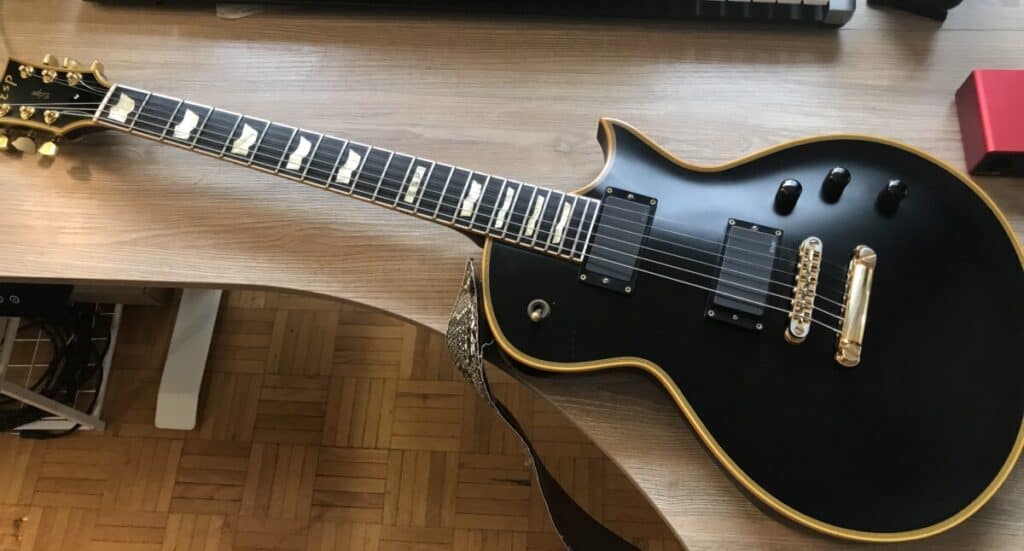
When I was taking all of the strings off of my guitar for this experiment, by force of habit, I almost cut them with my needle-nosed pliers.
Obviously, you don’t want to do that. My Eclipse has Sperzel locking tuners, so when you pull the strings out of the tuners, they tend to come out a lot easier. This part was fairly straight-forward.
2) Fill A Big Pot With Water
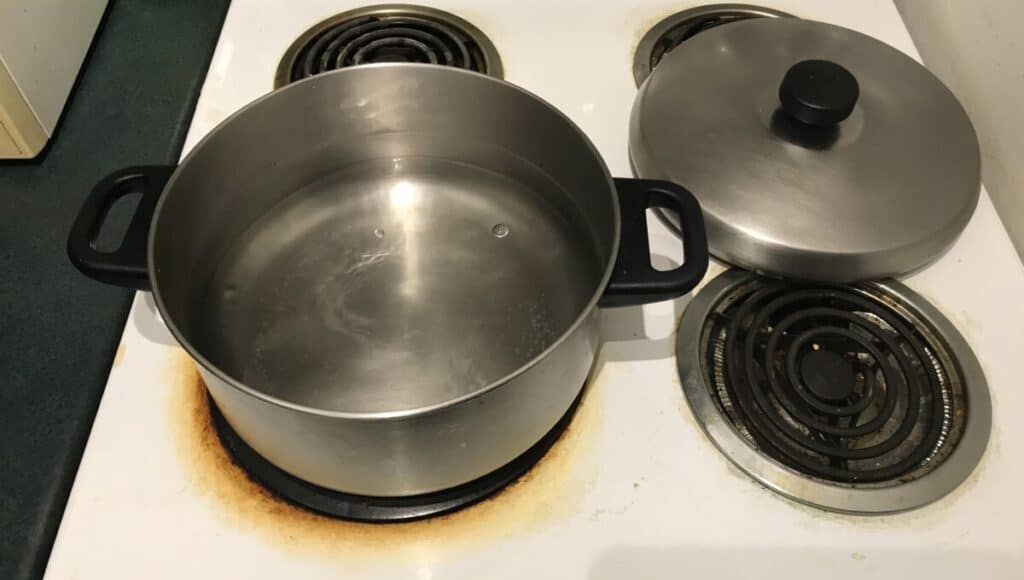
You don’t have to get a big pot of water, but I chose to do it that way just because I wanted to make sure that everything worked properly. Better to have too much than not enough, as a wise man once told me.
You would probably do just fine with a small sauce pan, but I chose a larger one. It’s important to note that it takes a little longer to boil a big pot of water. I filled it around 1/4 full.
3) Lay A Towel Down
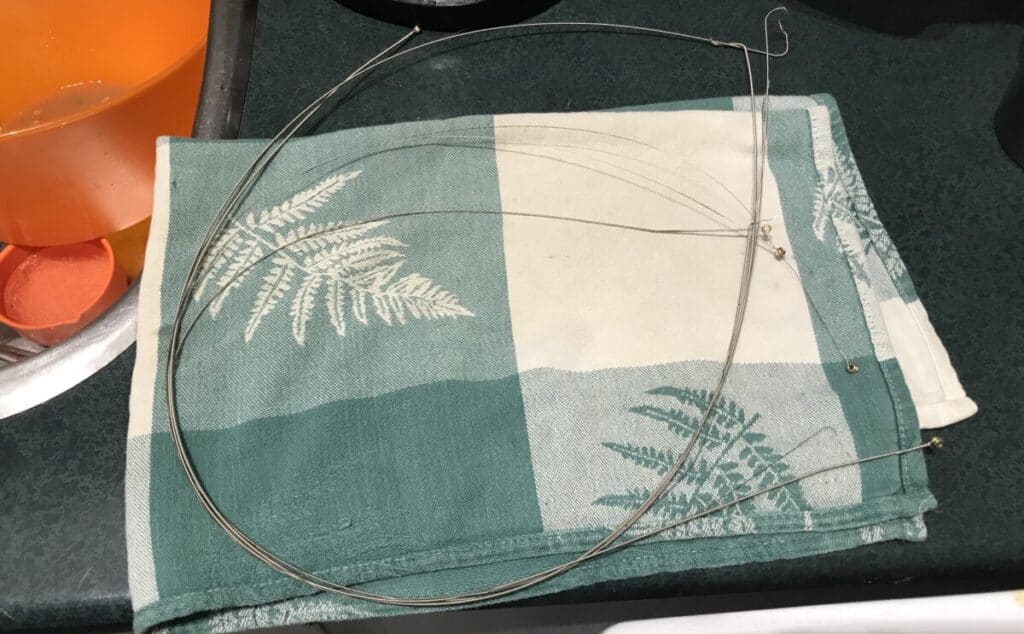
You also want to make sure that you’ve laid down a towel beforehand that way you have a place to actually put the guitar strings once you’ve taken them out of the water. You don’t have to be picky with this; any old towel will do, although, I prefer using an older one rather than a nice, clean one.
4) Bring the Water to a Boil
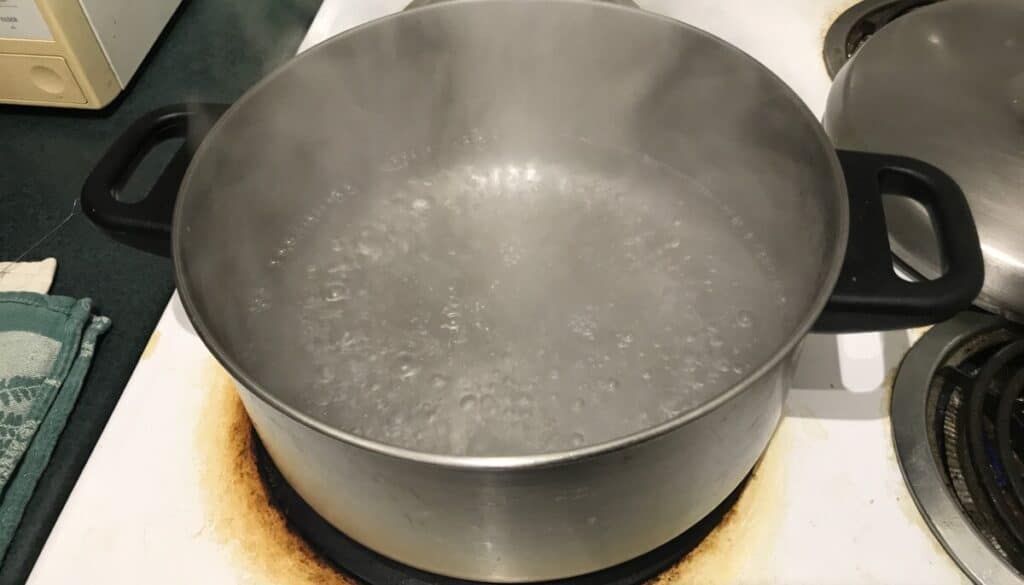
This is self-explanatory; just bring the water to a boil. I’ve read elsewhere that it’s better to use filtered water rather than regular tap water due to the number of pre-existing chemicals already in tap water, however, I don’t think it’s necessary to use filtered water to boil your strings.
You could do that if you really wanted too, but I imagine that boiling the water does a fairly good job of eliminating anything that would stop your strings from working well. Boiling water will mostly remove bacteria rather than metals.
5) Wrap the Strings Like How They Come In the Package
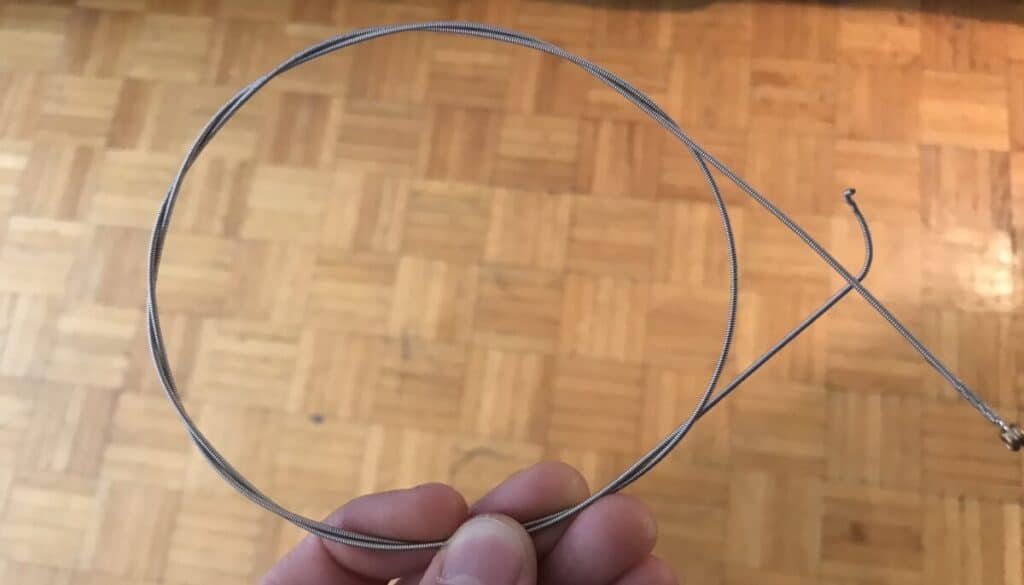
Wrap all of the strings similar to the way they look when they come in the package. This means you have to wrap it in a circle and weave the end around and around the circle which looks like what you can see in the image above.
Do this to every single guitar string before you start tossing them in the water, because you want to ensure that each string has an equal amount of time in the hot water.
6) Drop Them Into the Water
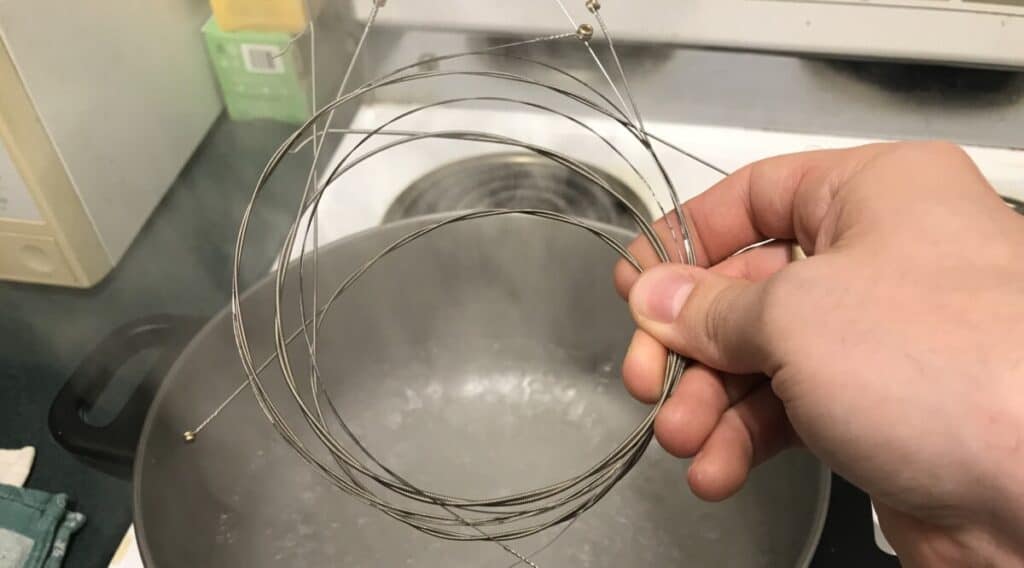
Using the tongs (or your fingers, it doesn’t actually matter), throw every single string into the water one by one.

It doesn’t matter which one you put in first, just make sure they all go in for the same time approximately. Get ready to set a timer because you don’t want to put them for too long or too little time.
7) Leave The Guitar Strings In The Pot for 5 Minutes
Once the guitar strings are in the water, put a cover on them and then set a timer for 5 minutes. I think putting them in for longer than 5 minutes would be overkill. I’ve also read that you don’t want them to boil for too long for fear of making them brittle and weak.
8) Pull Them Out With The Tongs
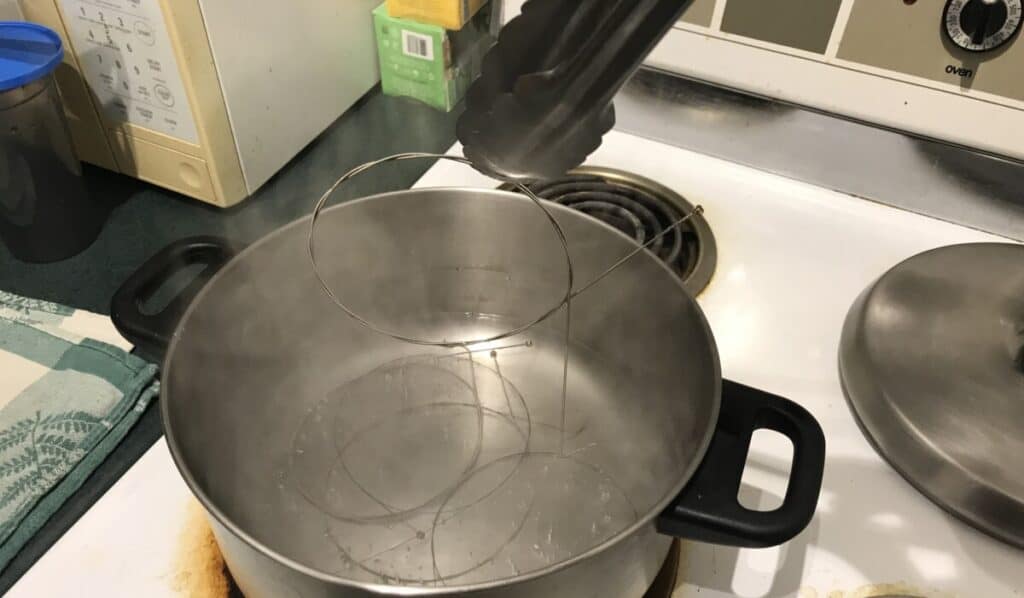
After the 5 minutes have gone, take the strings out one by one with the tongs and set them on a towel. You’ll absolutely need to use tongs for this part otherwise you’ll risk burning your fingers. Thankfully, the strings don’t hold the heat that long though.
9) Let Them Sit For An Hour After Drying Them With A Towel
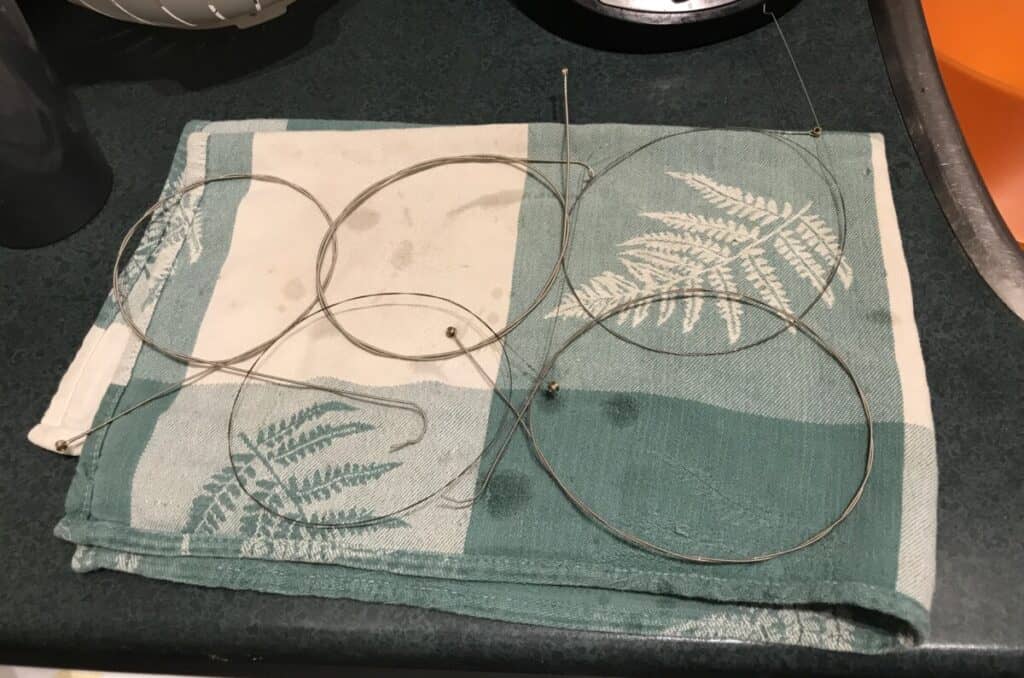
Thoroughly wipe the strings down with a towel and wait at least 15-20 minutes for them to dry. By “wipe them down,” I mean you really want to take a towel and – with a decent amount of pressure – turn the strings around while squeezing the cloth against the fabric.
You’ll notice that this will take a considerable amount of dirt off the towel. You can see what that looks like here.
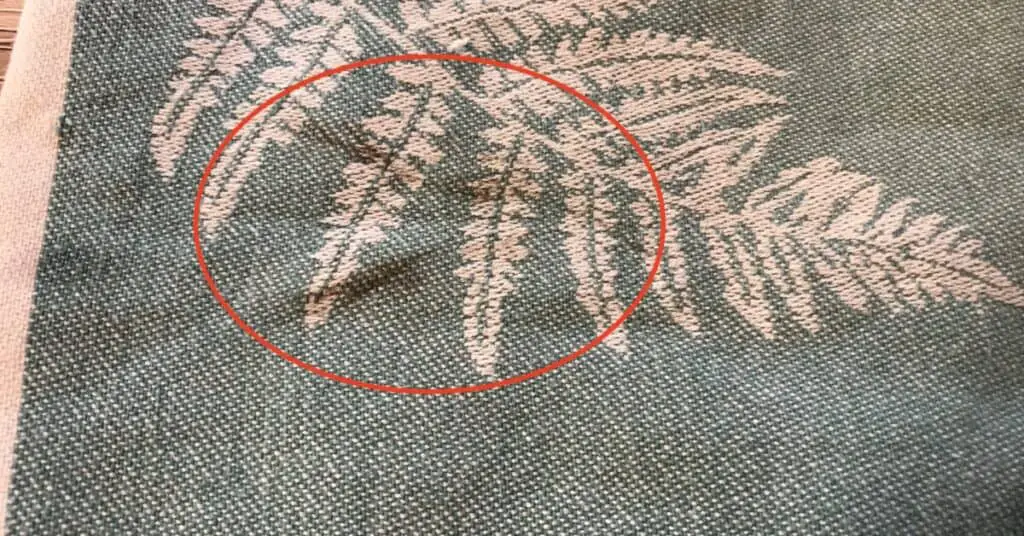
Now that the strings have been wiped down and they’re ready to go, set them down on the towel and wait.
You could wait a full hour but I don’t think it’s that necessary. I wrote one hour just for the sake of prudence. As I’ve already said once in the article, you don’t have to put them in the oven for them to dry either.
10) String Them Back Up After 15-30 Minutes to an Hour
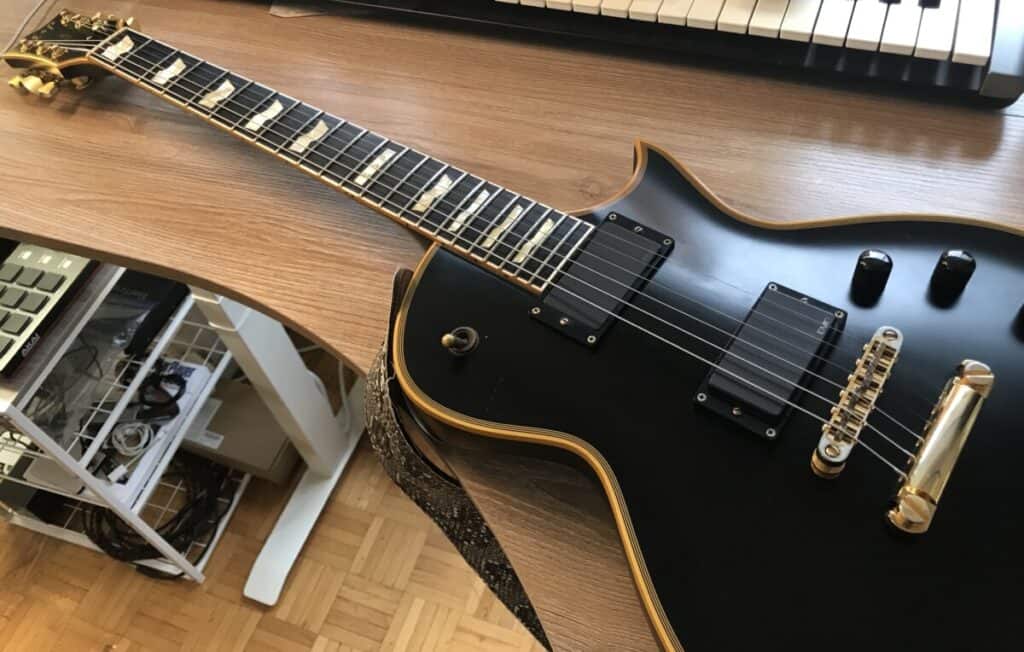
Touch them with your fingers and see if they’re dry enough to go on the instrument. If they are, then string them back up and see how they sound. Before you string them up, you’ll notice that they’re just a bit cleaner-looking although they won’t have that fresh look.
Results of the Boiled Guitar String Experiment
Like I already said at the first part of the article, boiling guitar strings definitely helps to remove grime and dirt which leads to increased tone and playability, however, they’re still not as good as fresh strings.
Additionally, the return on investment in terms of total time/versus/money spent makes it not worth it.
The most expensive guitar strings are Elixirs and it takes about an hour and a half to boil the strings and then let them dry. For me, the return on investment just isn’t worth it. If guitar strings were $50, then maybe I would consider boiling the strings all of the time, but they’re not super expensive.
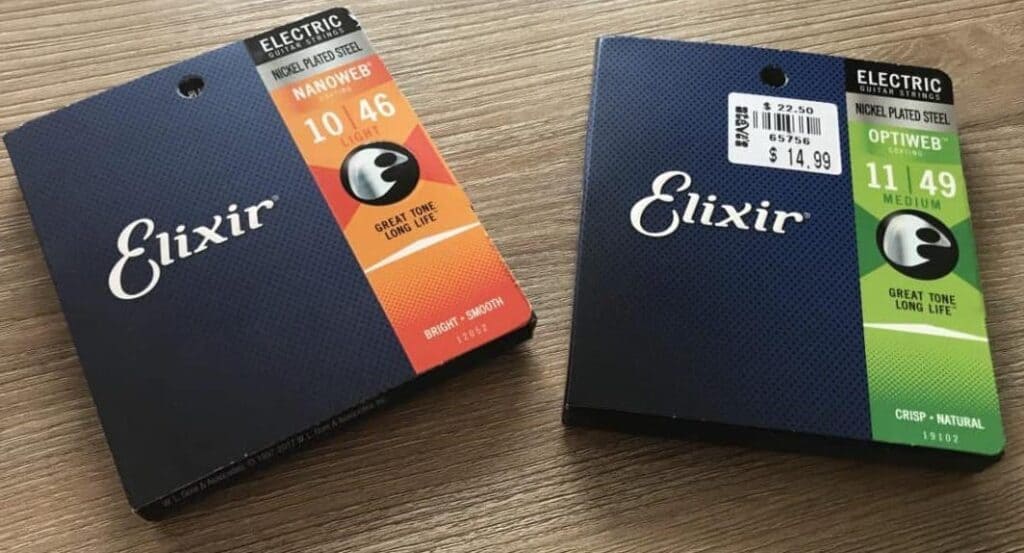
In fact, you can get most strings for less than $10. You can get a three-pack of Ernie Ball Slinky’s. Maybe this would be a better practice for bass strings which tend to be a little bit more expensive than guitar strings.
Should You Boil Your Guitar Strings?
There’s no question that boiling your guitar strings does work, but there is a time-versus-money trade off that one has to consider. If you’re the type of person who likes to save a relatively small amount of money ($8-$14), then boiling your guitar strings is a great way to do that.
Realistically, I change the strings on my guitars about every 4-5 months, even though I probably should change them once every 6-8 weeks. So really, I’m only spending around $20-$30 per year on guitar strings.
Put simply, it’s not exactly a life or death expense, and even if I were to change the strings every 2 months, that would only be $60 per year spent on guitar strings. It’s not a lot of money!
Additionally, and as I said earlier, Elixir guitar strings actually do work which you’d know if you’ve read my comparison/experiment here.
I know that personally, I’ll be using Elixir guitar strings going forward because they last much longer than non-coated guitar strings. If you spend an extra $6 on your guitar strings, they’ll last that much longer, and then you won’t need to boil them to get more life out of them.
How Do You Revive Old Guitar Strings?
To boil your guitar strings, you just have to take all of the strings off the instrument, wrap them up as if they’re brand new, and then put them in a pot of boiling water for 5 minutes. Take them out and let them sit for an hour before stringing them back up.
Another way that you can revive your old guitar strings is just by cleaning the ones you already have on (to figure out what gauge they are, you can use a caliper too as I’ve suggested before).
I used to wipe my strings down after every time I played because when the oil sits on the strings for a long time, they’ll tend to wear them down much faster. Some people like to buy string conditioner but I find conditioner doesn’t really work the way that it’s supposed too].
Ultimately, the best way to keep your strings fresh is to keep them in a humidity-controlled environment, wipe them down after playing, and then boil them once they’ve collected a considerable amount of dirt and grime.
Does Water Ruin Guitar Strings?
As this experiment has shown, water does not ruin guitar strings. After putting the guitar strings in a pot of boiling water for five minutes and then letting them dry, the water actually had the opposite effect on the strings. It made them brighter and cleaner.
However, I wouldn’t want to leave a set of guitar strings in a pot of water for multiple hours or overnight. Nor would I want to leave them out in the rain. I imagine that if you’re just setting them in water for a short amount of time and then patting them down with a towel, you won’t run into any noticeable issues.
Does Heat Affect Guitar Strings?
Heat doesn’t affect guitar strings, however, heat and humidity do have an impact on the wood that the guitar is made of. Humidity and heat can cause the electric body to expand or contract, leading to increased tension from the strings or decreased tension.
So in a roundabout way, heat can have an affect on guitar strings but it’s mostly on the wood of the guitar rather than the strings themselves. One issue that I’ve ran into repeatedly, for example, is breaking the string after going through a temperate environment.
I believe it’s because the guitar is tuned sharp without me realizing it due to the body absorbing moisture, and then a particularly high bend winds up snapping the highest e-string.
There are a few other reasons why your high e-string might always snap which I’ve talked about before, but this is something that I’ve noticed during the June to August months in my city.
Other Articles You May Be Interested In
- What Makes Guitar Strings Go Dead? [ANSWERED]
- When To Change Your Bass Guitar Strings? [ANSWERED]
- Can A Whammy Bar Break Strings? [ANSWERED]
Important Things to Note About Boiling Guitar Strings
1) Some People Put Them in the Oven
Personally, I don’t think it’s necessary to put your guitar strings in the oven after they’ve been taken out of the pot of boiling water but that’s something that some people apparently do.
Part of me thinks this is honestly pretty lame. If you’re going to that kind of length to save $10, then maybe it’s time to change priorities. Unless you’re the type of person who loves to get the most bang for your buck, I can’t see how this would be a good use of your time.
2) Make Sure to Coil the Strings
If you want to be able to actually get the guitar strings in the pot of water, you have to wrap them similar to how they come wrapped in the package. Make sure you wrap them up good, because you don’t want them to become unwound while they’re in the water.


 Written By :
Written By :
